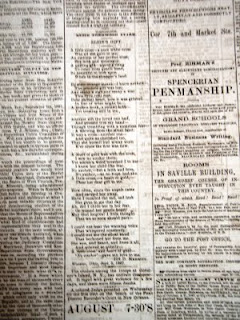I have been grading research papers and finals from my classes in addition to trying to wade through the final court martial transcript. I have finally finished the transcript, all 164 pages of it!
What a case. It has it all. An officer accused of conduct unbecoming etc. A pro-Southern crowd in the Varieties Theatre in New Orleans threw him out with the aid of the police. In the process he was bitten on the thumb and stuck in the head.
Whom does he run into when returned to a camp of the 1st US Infantry? Captain DeRussy, his old nemesis from the previous court martial. This provokes another incident and HCR tells him to “go to Hell” and offers that if he will come out of his tent “I will shoot you through the heart!”
Most telling in some ways was his written defense. He opens with a few comments on honor. They are included below.
"In order to fully comprehend the consequences of your decision in such a case, particularly if it be unfavorable to the accused, you must know the appropriate value and price of a Soldier's honor! A Soldier is the only man of all men, who feels himself rich indeed "when all but life and honor's lost!"
This is an Irish song from HYLAND'S MAMMOTH, AFTER THE BATTLE
Night closed around the conqueror's way.
And lightnings showed the distant bill.
Where those who lost that dreadful day
Stood, few and faint, but fearless still!
The soldier's hope, the patriot's zeal,
Forever dimmed, forever crossed.
Oh, who shall say what heroes feel,
When all but life and honor's lost!
The last sad hour of freedom's dream
And valor's task moved slowly by,
While mute they watched, till morning's beam
Should rise and give them light to die.
There's yet a world where souls are free,
Where tyrants taint not nature's bliss;
If death that world's bright opening be.
Oh, who would live a slave in this?
The last sad hour of freedom's dream
And valor's task moved slowly by,
While mute they watched, till morning's beam
Should rise and give them light to die.
There's yet a world where souls are free,
Where tyrants taint not nature's bliss:
If death that world's bright op'ning be,
Oh! who would live a slave in this?
Powerful stuff!
He continues:
“but to the Soldier All things Else sink into insignificance in comparison to his honor! Now, gentlemen, depriving the Soldier who has Sustained his own and his Country's honor on more than one hard and desperately fought-field of battle-learning the Evidence of his devotion to Country and of his own heroism to much the battle plain--of his hard earned reputation, by degrading him; strip him of all his well earned honors and his Soldierly pride, by passing a sentence in severity greater that the Criminality of the Offense. 'per se' would justify, then you send back to 'civil society' a person, who, if not forever afterwards deprived of, is forever prohibited....By sentencing away his character his former life as a Soldier, and his future history, whatever it may be, that time can never effase! You take from him a Soldier's all 'his honor'.”
"The affair at the Varieties Theatre....was a sheer and wanton violation of the rights of a gentlemen, and stamps it as an uncalled for, brutal, outrageous and cowardly and shameful attack upon an Officer of the United States Army. The incentives to such an outrage, and the cause of the perpetration thereof, being the deeply rooted, prejudices engendered in the bitter five years War of the Rebellion of the Southern States.”
"It is clearly shown…that the accused was laboring under a high state of mental excitement ? Under and by the brutal, unhuman, cowardly and shameful treatment he received…Treatment that would have almost made frantic and maddening with anger any gentleman who possessed the spirit worthy of a Soldier! What true man, what Soldier, we ask, would brave the indignities and insults offered to and the outrage perpetrated upon the person of the accused....and in consequence - of have been almost bordering upon madness itself....those who are so high-spirited and repellant in their natures that they cannot brook with indifference an affront or shameful and disgraceful indignity, but who loose entire control of that Devil-attribute of our nation-passion-and there commit acts which others of a cooler and more phlegmatic nature would never be guilty of."
He also cites in conclusion all the battles he served in, I need this as it was incomplete in my mind.
“Purdy Bridge May 2d 1862
Siege of Corinth-Battle of Corinth 3&4 1862,
Champion Hills and Big Black River in the Miss. Campaign of 1863
Siege of Vicksburg being interruptedly engaged and under fire for 45 days and on duty each day of the protracted Siege
New Market Heights 25 Sept 1864, where for the first time a permanent advance position was gained on the north side of the James,
First Hatcher Run
movement of the Army of the Potomac about Petersburg to the left by the Brotherton Plank Road Oct 25th 1864
Second Hatcher's Run Feb 6th 1865
Battles around Petersburg 30 - 31st March and 1 & 2nd of April1865.
The pursuit of the Rebel Army of Northern Virginia the finale of that brilliant and wonderful 21 days.
In each of the above battles and engagements the accused has borne an honorable part. And has received the approval and commendation therefore of his different immediate commanding officers, and in several instances of the Commanding Generals."
In the next few weeks, I will be meeting with a Army behavioral psychologist along with an expert on military suicide, and a neuropsychologist.





































































